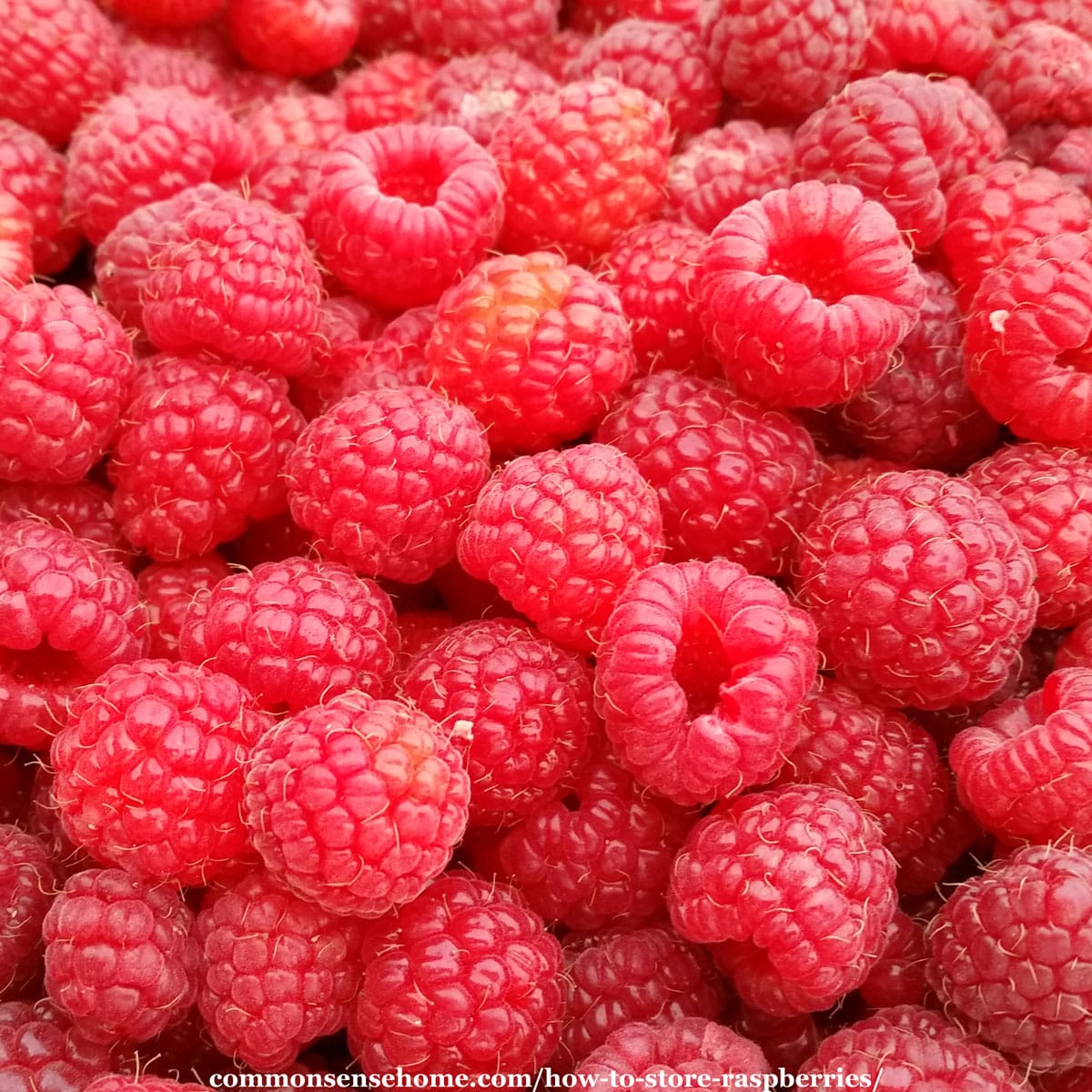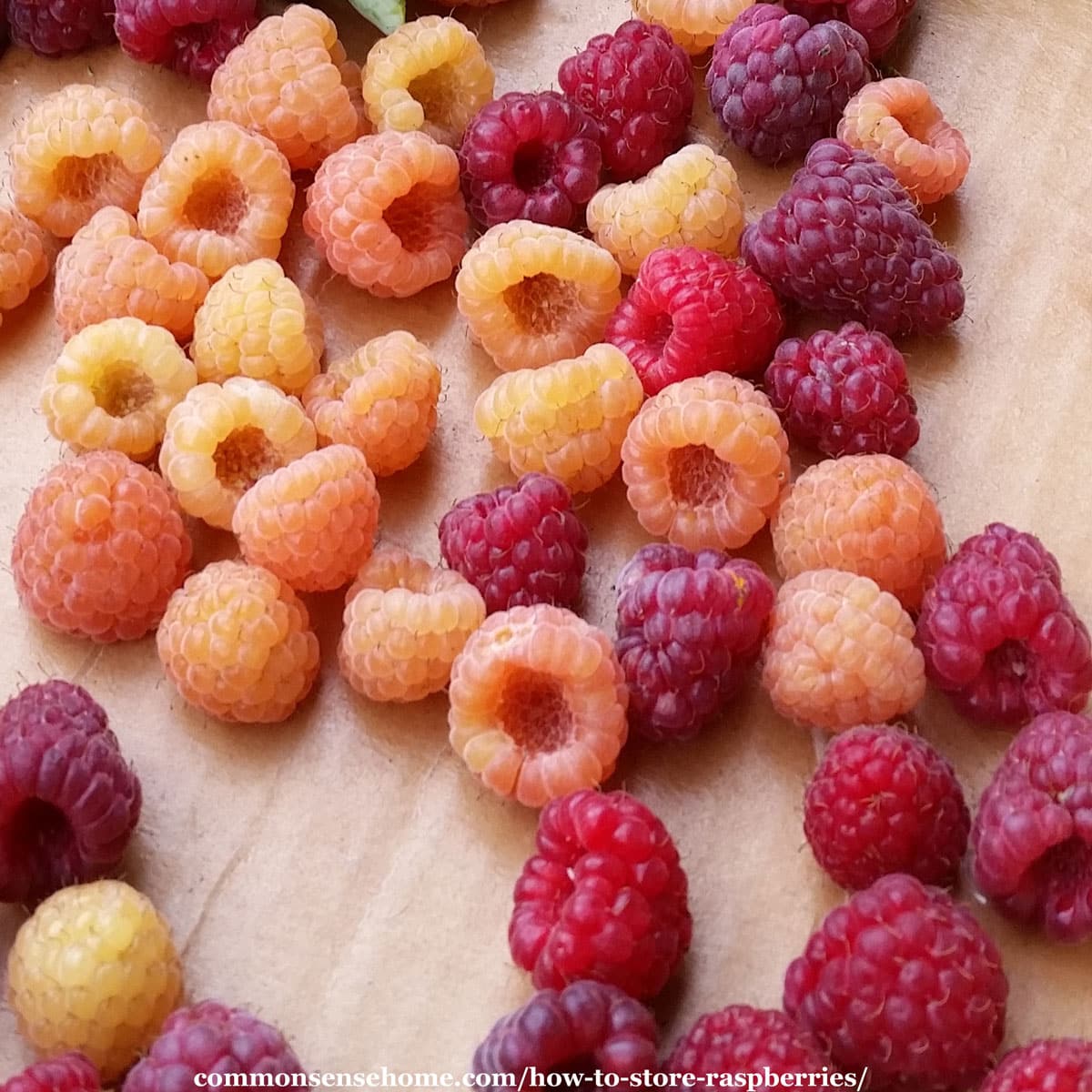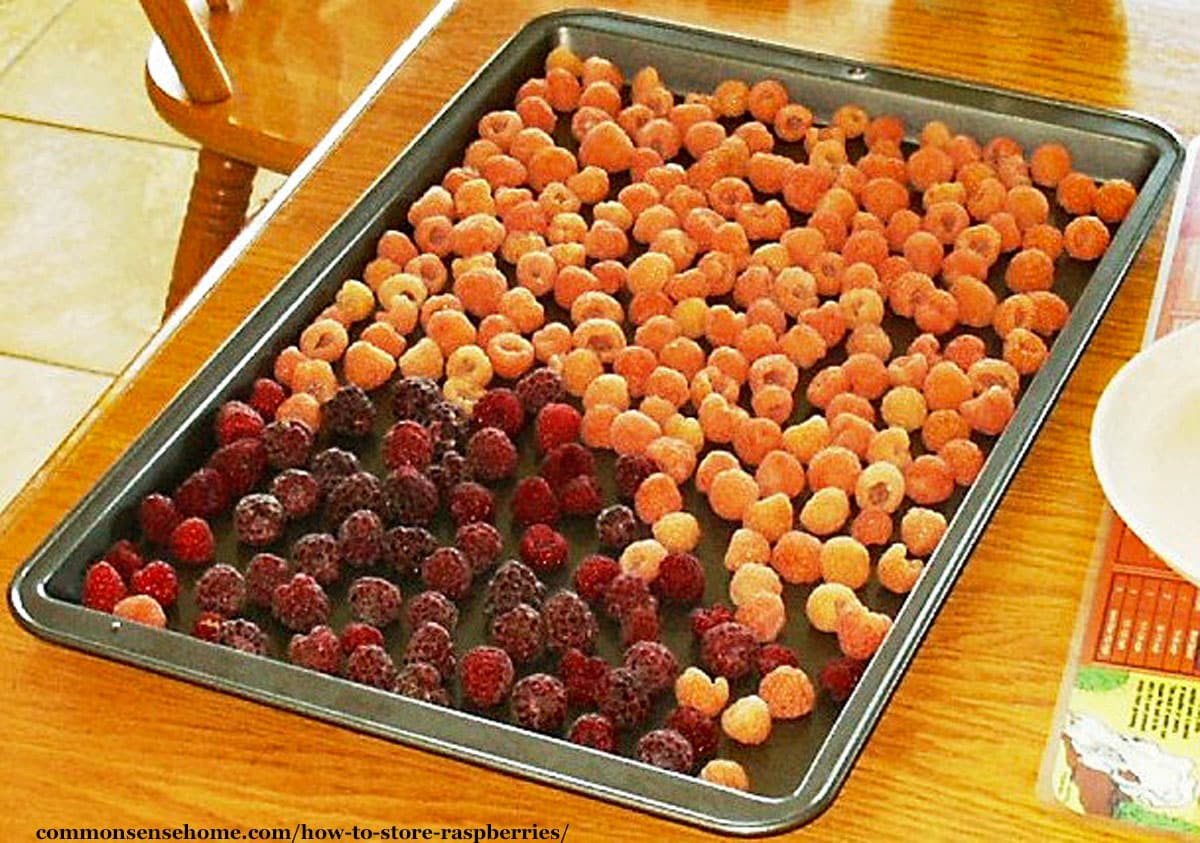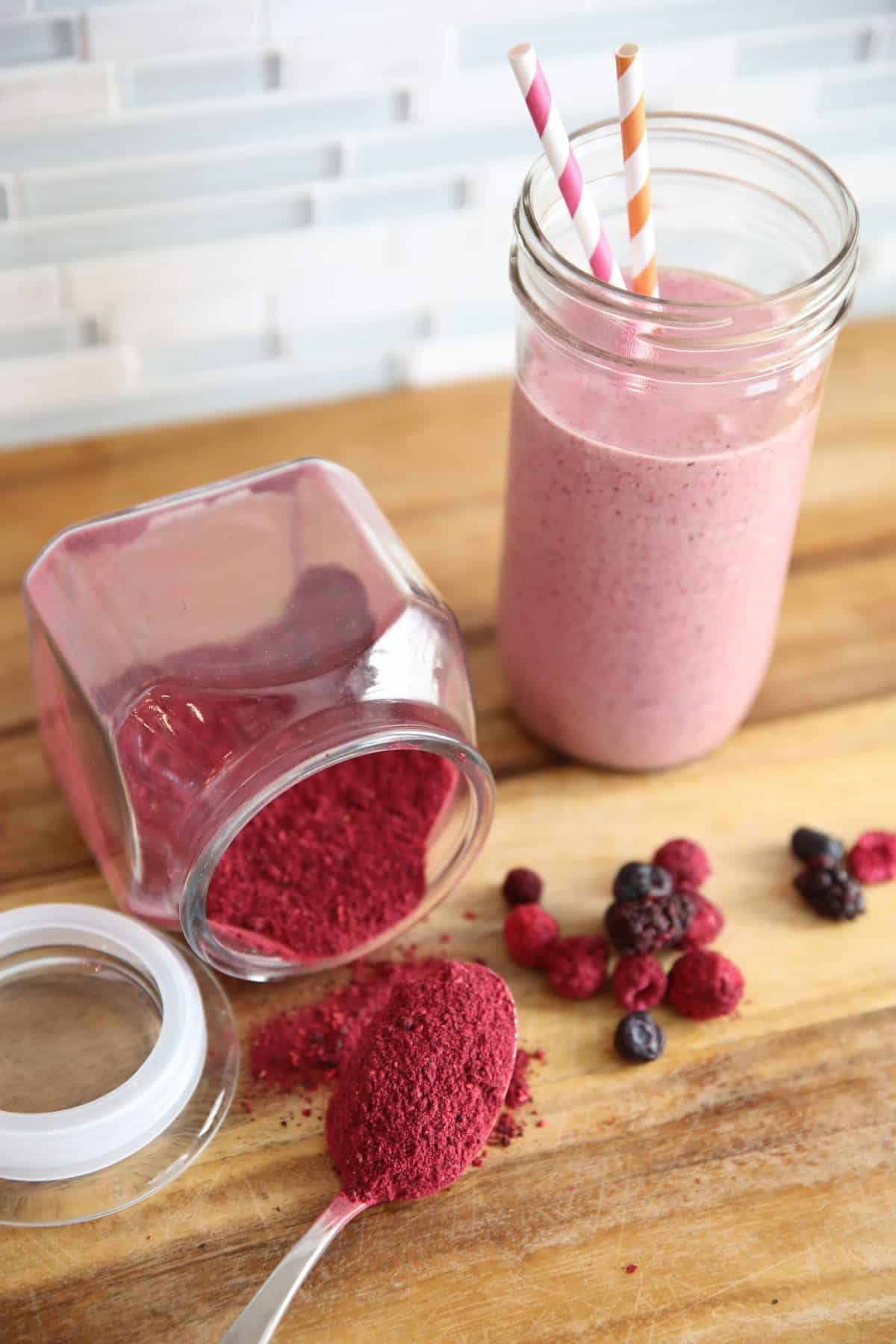How to Store Raspberries (Short Term & Long Term)
This post may contain affiliate links. Read my full disclosure here.
Peak season for raspberries is June through August, so we need to preserve them if we want to enjoy the best berries year round. We’ll share how to store fresh berries so they last longer, plus how to store raspberries for a year or more.
No one likes moldy berries, so you need to use ready to eat berries promptly, or preserve them. Fresh raspberries will not last long.

Picking Raspberries in the Patch or Grocery Store
At the grocery store, carefully inspect the bottom of the container. Watch out for excess moisture or smashed fruit. Look for bright color – underripe fruit will be lighter in color.
When picking in your raspberry patch or a “you pick” farm, ripe fruit will pull easily off the cane. If fruit is mushy, or being snacked on by bugs, we collect it in a separate container for the chickens.
Use a shallow container for picking. aiming to keep fruit in a single layer, or at least not too deep. If you gather raspberries in a bucket, it’s best to turn them into jam ASAP. The bottom berries will get crushed.
How to Store Raspberries
First step for ANY storage methods is to pick through the raspberries. Remove debris or bugs, and remove moldy, bruised berries, very soft or crushed fruit.

Do not wash your berries, unless you plan to process them immediately. Moisture will cause raspberries to mold, rot or degrade quickly. The exception to this rule may be the vinegar rinse method, which I’ll get to in a bit.
When you’re ready to eat your fresh berries, rinse them with cool water and pat them dry. Raspberries are at their sweetest at room temperature, so prep them for serving an hour or so before you need them.
Do raspberries need to be refrigerated?
Yes, refrigeration will prolong the life of fresh raspberries. Keep raspberries in their original clamshell container, or any open container. Do not store raspberries in an airtight container.
You want to keep your berries dry. To help with this, line the container with paper towels or a washable absorbent cloth.
Keep the container away from corners of the refrigerator and out of the crisper drawer. The best spot for berries is front and center, where it’s not quite as chilly and moist. (Between 32° and 34°F (0 to 1 °C) is best.)
Raspberries will keep from 1 to 3 days in the fridge.
Vinegar Rinse for Raspberries
I don’t normally rinse my berries until we’re ready to eat or process them, but some people swear by a vinegar rinse.
To do a vinegar rinse for raspberries, combine 1/4 cup white vinegar and 3/4 cup hot water. (Double or triple the vinegar and water for more berries.) Soak the berries in the solution for a minute or so, then drain in a colander, rinse with cold water, and gently pat dry.
The goal of the vinegar rinse is to kill off mold spores and bacteria. Store the dry berries in the refrigerator as described above.
Can you eat Moldy Raspberries?
Whether you pick the berries from your garden, get them from a farmers market or a store, all raspberries likely have mold spores. Our goal is to eat or process the berries before those spores bloom and ruin the berries.
If your raspberries have visible mold, it’s best to toss them in the compost pile.
How to Dehydrate Raspberries for Storage
Clean and rinse your raspberries and pat dry. Place the raspberries in a single layer in the dehydrator on mesh sheets. Dehydrate at 125°F (52°C) for 24-36 hours or until powdery dry.
To test dryness, place the dried berries in an airtight jar for around a week. Shake the jar daily. If at any point you see condensation inside the jar, dry the berries more.
Store dehydrated raspberries in an airtight container in a cool, dry location for up to a year.
Would you like to save this?
How to Dry Raspberries in the Oven
Preheat oven to 150°F. Put raspberries spaced on baking pan, preferably with a liner, bake until powdery dry. See more information on oven drying.
Test dryness and store as listed above.
How to Freeze Raspberries
Clean and rinse berries and pat dry. Spread the raspberries in a single layer on a baking sheet lined with wax paper or reusable parchment paper. Freeze till solid – 4-6 hours, or overnight.
Place frozen raspberries in a zip lock freezer bag, or vacuum seal for better storage quality. The vacuum seal bags virtually eliminate freezer burn, which is a major problem with individually frozen fruits and veggies not protected by a sauce or syrup.
Frozen raspberries will last up to 1 year.

How to Freeze Dry Raspberries
If you want to freeze dry raspberries, you need a Harvest Right freeze dryer. Raspberries work really well for freeze drying. The berries flavor is amazing, and you can use the berries to make freeze dried raspberry powder.
Clean and rinse berries and pat dry. Fill the free dryer trays in a singe layer and run on default cycle. It takes around 24 hours to freeze dry raspberries. If you freeze the berries on the trays before loading them in the freeze dryer, the cycle goes a little faster.
To store your freeze dried raspberries, place them in Mylar bag or a mason jar with an oxygen absorber. Freeze dried raspberries can last from 5 to 30 years.

How to Can Raspberries
It’s safe to can raspberries in a water bath canner. Fill jars with raw raspberries, shaking down gently while filling. Cover with hot syrup, juice, or water, leaving ½-inch headspace.
Wipe down rims and place canning lids on the jars. Process pints or half pints for 15 minutes, quarts for 20 minutes. Adjust processing time for altitude if required. (See Altitude Adjustments for Canning.)
Remove jars from canner and place on kitchen towel on counter. Allow to cool completely, remove rings and check seals. Date and label and store in a cool, dark location. For best quality, use within 18 months.

Raspberry Recipes to Use your Stored Raspberries
We store raspberries in summer, then turn them into yummy treats when the weather cools down. Frozen berries work great in jams, jellies, and pies.



Thank you so much for all the information.
Bobby
You’ve very welcome.
Thanks for sharing so many different ways to use my raspberries. Raspberries will be coming soon here and I can see tell tale signs of them getting ready to have fruit.
This is the third year for the raspberry vines and added a new one this year.
I will probably eat some, can some and dehydrate some. I just finished making fruit leathers with rhubarb, mulberries and bananas. Maybe I’ll do something similar with the raspberries.
Thanks again for sharing and have a great Sunday evening.
P.S. I’m glad you took time out for yourself and are refreshed.
I’m very sorry for the hateful emails and comments.
Keep on doing what your doing!
Many more of us appreciate what you share than those who don’t!
Thank you for your kindness, Cindy. Raspberries are next up for watering, as yesterday’s “rain” was more of a mist. The blueberries and juneberries got soaked this morning.